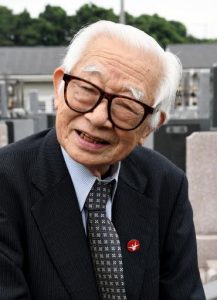Obituary: Mikiso Iwasa, former co-chairperson of Japan Confederation of A- and H-bomb Sufferers Organizations
Sep. 24, 2020
Dies at 91 on September 7, 2020
by Michiko Tanaka, Staff Writer
Fought against nuclear weapons with mother and younger sister in his heart
In June 2019, Mikiso Iwasa appeared with a swollen face at a meeting held in the national Diet building by the Japan Confederation of A- and H-bomb Sufferers Organizations. The aim of the meeting was to press the Japanese government to ratify the Treaty on the Prohibition of Nuclear Weapons (TPNW). I cannot forget his smile, when he said, “I’m all right,” and explained, “I just took a little tumble. I always say the same thing, right? I’ll fight as long as I live.” True to his words, he continued to fight against nuclear weapons throughout his life.
Mr. Iwasa was a 16-year-old student at Shudo Junior High School when he experienced the atomic bombing in the yard outside his house, located in the district of Fujimi-cho (now part of Naka Ward), Hiroshima, 1.2 kilometers from the hypocenter. His beloved mother had become trapped under the collapsed house right in front of him. Escaping from raging fires, he left behind his mother, who had urged him to run as she began reciting the Heart Sutra. His 12-year sister, who had been mobilized to help demolish houses to create fire lanes as part of the war effort, also died in the bombing.
“I said to my mother, ‘I’ll also die and come to you someday,’ and abandoned her. I’m such a bad son, living to this age,” said Mr. Iwasa. Whenever he spoke of that day, his eyes filled with sorrow.
Mr. Iwasa’s sense of guilt nourished a feeling of hatred toward atomic weapons. In 1954, a Japanese tuna fishing boat was exposed to radiation from a U.S. hydrogen bomb test performed at Bikini Atoll. Prompted by that incident, he began to engage in the anti-nuclear movement. At that time, he was teaching the history of British thought at Kanazawa University in Ishikawa Prefecture. In 1960, he founded an organization for A-bomb survivors residing in Ishikawa Prefecture. Around the same time, he started to play a central role in the Japan Confederation of A- and H-bomb Sufferers Organizations.
Mr. Iwasa took the lead on a survey of the actual conditions faced by A-bomb survivors that the Japan Confederation of A- and H-bomb Sufferers Organizations had pushed for in the 1980s with the aim of appealing to the Japanese society for enactment of the Atomic Bomb Survivors Relief Law. He also visited overseas countries, communicating his thoughts as an A-bomb survivor: “The cruel end to the lives of the A-bomb victims cannot be called ‘a death befitting human beings.’ Unless there is progress in nuclear abolition, the A-bomb victims cannot be assured they did not die in vain.” The great power contained in his words likely derived from his first-hand knowledge of the heartache of A-bomb victims.
Together with Mr. Iwasa, I once visited his family’s gravesite in Funabashi City, Chiba Prefecture. The epitaph on the gravestone reads, “Eternal prayer: Peace.” Mr. Iwasa explained, “This is my pledge to continue to wish for peace and convey the suffering of the A-bomb victims.” He will be laid to rest there, beside his mother and younger sister, in October, when a memorial service is held on the 49th day after his death. As of September 23, after five more nations or regions ratify the TPNW, the treaty will go into effect. I hope to reflect on the bitter disappointment of Mr. Iwasa, who was never able to make a report of such a day in front of his family grave.
(Originally published on September 24, 2020)








